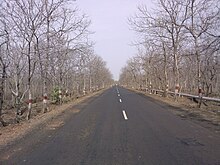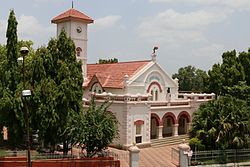|
Yavatmal
Yavatmal (ⓘ is a city and municipal council in the Indian state of Maharashtra. It is the administrative headquarters of Yavatmal District. Yavatmal is around 90 km away from divisional headquarters Amravati while it is 670 km (420 mi) away from the state capital Mumbai and 150 km south west of Nagpur. EtymologyThe name is derived from the Marathi Yavat (mountain) and mal (row). Another theory is it might be derived from Yavateshwar (Lord Shiva) and Mal (one of the marathi word for Plateau)[citation needed] as the city is located on a plateau, which is comparatively higher altitude than its other tehsils.[citation needed] HistoryFormerly known as "Yeoti" or "Yeotmal", Yavatmal was the main town of the Berar Sultanate and according to old writings "the safest place in the world". The then region of Yavatmal (now Yavatmal district), was part of the dominion of Aladdin Hassan Bahman Shah who founded the Bahmani Sultanate in 1347. In 1572, Murtaza Shah, ruler of the Ahmadnagar Sultanate (current day Ahmadnagar District), annexed the Yavatmal district. In 1596, Chand Bibi, warrior queen of Ahmadnagar, ceded the district of Yavatmal to the Mughal Empire, then rulers of a large part of India. Following the death of the sixth Mughal Emperor Aurangzeb in 1707, Yavatmal was passed on to the Maratha Empire. When Raghoji I Bhonsle became ruler of the Nagpur kingdom in 1783, he included the Yavatmal district in his territory. After the British East India Company created Berar Province in 1853, Yavatmal became part of East Berar District in 1863 and later part of the South East Berar district—both districts of the Central Provinces and Berar. Yavatmal remained part of Madhya Pradesh until the 1956 reorganisation of states when it was transferred to the Bombay State. With the creation of the Maharashtra state on 1 May 1960, Yavatmal district became a part of the same. Yavatmal Municipal Council was constituted in 1869 but was dissolved shortly thereafter. It was established again in 1894 and thus forms the oldest municipal council in the district. Mr. Eliot was first mayor and Lieutenant, W. Hege was deputy mayor. Govind Punaji Bari was the first Indian president of the Yavatmal Municipal council (2 January 1914 to 31 May 1932). The first elections conducted for the position of president of municipal council were held on 22 December 1934. Prior to that the same was appointed.[citation needed] The mini-train called Shakuntala is a historic remark built by the British government to transport cotton which is now closed. DemographicsAs of 2011 Indian Census, Yavatmal had a total population of 116,551, of which 58,549 were males and 58,002 were females. The population within the age group of 0 to 6 years was 11,360. The total number of literates in Yavatmal was 96,726, which constituted 82.9% of the population with male literacy of 85.1% and female literacy of 80.9%. The effective literacy rate of 7+ population of Yavatmal was 91.9%, of which the male literacy rate was 94.8% and the female literacy rate was 89.1%. The Scheduled Castes and Scheduled Tribes population was 19,816 and 6,543 respectively. Yavatmal had 26,173 households in 2011.[1]
ReligionMajority of the population follow Hinduism, followed by significant Muslim and Buddhist minorities.[3] LanguageThe principal language of the Yavatmal district is Marathi however Varhadi dialect of Marathi majorly spoken by people of Yavatmal. However, since the district has numerous Scheduled and Nomadic Tribes, other languages such as Gormati or Banjari, Gondi, Beldari, Urdu, Telugu and Kolami are also spoken in parts of the district. In 1973, the Marathi Sahitya Sammelan (Marathi Literature Conference) was hosted in the city for the first time which was presided over by Gajanan Digambar Madgulkar. The second time, it was hosted on 11 January 2019 chaired by Vaishali Yende, widow of a suicide victim farmer, to highlight the issue of farmer suicides in the area.[citation needed] CultureYavatmal is known for its unique Navratri festival celebration, the whole city is known for organising huge celebration events for Navratri. Festivals like Gudi Padwa, Diwali, Dussehra, Christmas, Easter Sunday and almost all Hindu and Christian occasions are celebrated. The district is also home to a Buddhist community, and they celebrate Ambedkar Jayanti in huge gatherings. ClimateThis city has a tropical savannah climate. The Köppen-Geiger climate classification is Aw. In Yavatmal, the average annual temperature is 26.8 °C. The rainfall here averages 946 mm.
EconomyDuring British rule, Yavatmal city was classified as a hill station. Both cotton-ginning and pressing are carried on in Yavatmal, while the town is also the chief trading center in the district and connected by road with Dhamangaon station, 29 miles (47 km) away. Major business establishments in Yavatmal include the Raymond UCO mill that produces denim fabrics for jeans. There are establishments related to the cotton, and textile industries. There is a 106-acre (0.43 km2) textile Special Economic Zone (SEZ) under construction while HLL Unilever has also decided to restart the plant they currently have in the city. Other local businesses in the town are dominated by the presence of agricultural supply facilities used by the nearby farming community. Banking services are available in the Yavatmal, Arni, Ner, Pusad, Digras, Ghatanji and Kelapur(Pandharkawada) and Wani areas. The major industrial centres are at: MIDC Lohara, Darwha, Digras, Pusad, Umerkhed, Wani, Umari, Kelapur, Ralegaon and Babhulgaon, Ner, and Wani-Maregaon with the main market places in: Yavatmal City, Arni, Wani, Darwha, Digras, Ghatanji, Mohada, Pusad, Umerkhed and Kelapur. Transport Roads
Railways
AirportInternational
Regional
EducationProminent educational institutes:
Notable people
See alsoReferences
External links |
|||||||||||||||||||||||||||||||||||||||||||||||||||||||||||||||||||||||||||||||||||||||||||||||||||||||||||||||||||||||||||||||||||||||||||||||||||||||||||||||||||||||||||||||||||||||||||||||||||||||||||||||||||||||||

